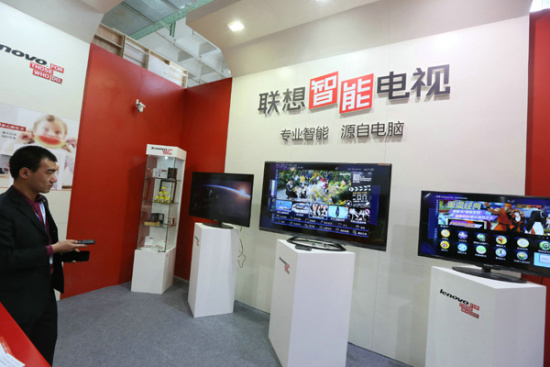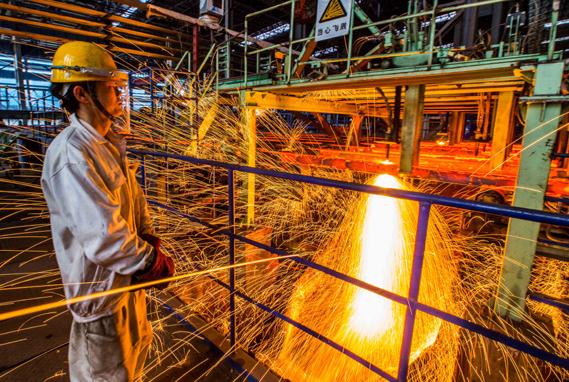Prada gets a makeover
May 22nd, 2015
Based on the 2015 spring/summer collection, Prada's new store designs by some of the most acclaimed costume designers in the film industry, were shown for the first time in Beijing last month.
Top costume designers from Hollywood have re-designed the fashion label's flagship stores around the world. Sun Yuanqing looks at their recent changes in Beijing.
Fashion and film have always been closely linked. In Prada's latest project, Iconoclasts, they come even closer.
In 2009, the Iconoclasts, which literally means creating a classic by breaking the norm, recruited renowned fashion editors such as Carine Roitfeld, Katie Grand, Alex White and Olivier Rizzo to remodel Prada stores in Paris, Milan, London and New York.
This year, Prada invited some of the most acclaimed costume designers in the film industry to recreate its flagship stores, based on the 2015 spring/summer collection. First staged in New York, London and Paris during fashion weeks, the new store designs were shown simultaneously for the first time in Beijing last month.
Among the designers is Milena Canonero, the legendary Italian designer, who recently won an Oscar for her work on The Grand Budapest Hotel. It was her ninth nomination and fourth win at the Oscars. Her portfolio includes classic films such as A Clockwork Orange, Barry Lyndon and Out of Africa.
Canonero re-created her design in Prada's Paris store in Beijing's In88 branch. She drew on the feng shui philosophy, reinventing the space with elements such as water, fire, air, earth and most importantly, human love. Mannequins wore Prada clothes, striking unconventional poses expressing love and loss of love.
The feng shui philosophy has harmony with nature at its core, which compliments the rich and diverse style of Prada's new collection, Canonero says.
"It is very exciting to have this opportunity to display my project in China. I have a great love for this country, its history and traditions. I am interested in seeing how people will react to our Iconoclasts," she adds.
Arianne Phillips, stylist on Kingsman: The Secret Service, was responsible for the re-design of the Shin Kong Place store.
Phillips is a two-time Oscar nominee for Walk the Line and W.E.. She was also nominated for the British Academy of Film and Television Arts awards for A Single Man. She is also Madonna's stylist.
Phillips turned the store into a "cinematic dreamscape that tells stories and creates characters". Natural elements like purple sand, rocks and trees, as well as moss and orchids, adorn the store windows.
"Nature to me is real beauty," she says adding that the latest collection is as close to beauty as nature.
Now, mannequins in the store wear coats covered in patchwork and tribal designs, inspired by Prada's new collection.
Phillips recently directed her first film, a five-minute short for Prada called Passage. The movie, shot in the desert in California, depicts a girl's conceptual journey from one place to another.
The movie aims to give another view of the collection, she says.
Michael Wilkinson, who designed for the movie American Hustle, and his partner Tim Martin brought their work from Prada's Broadway store in New York to its store in China World Mall. They transformed the venue into a party from the 1970s, a great period of self-expression. The store is envisioned as a place where "uptown meets downtown and celebrity meets street style".
Mannequins are dressed in brocade from the Prada spring/summer 2015 collection mixed with archive pieces. The dresses are decorated with mirrored tiles, sequins and stones, as well as headpieces inspired by Peking Opera.
Miuccia Prada, designer and CEO of the fashion house, remains the biggest inspiration for the designers.
"She always surprises me. She doesn't follow trend and we want to honor that spirit," says Wilkinson.
Lenovo, Alibaba in 'smart' alliance
May 21st, 2015
Smart TVs of Lenovo Group Ltd on display at a home appliance expo in Beijing. The company is setting up a new subsidiary to sell televisions online.
PC maker, e-commerce firm in partnership to sell television sets online
Lenovo Group Ltd is setting up a new subsidiary to sell televisions online, the company said on Wednesday.
Joining hands with Alibaba Group Holding Ltd's cloud computing arm, the new company is Lenovo's latest attempt to catch up with market leaders Xiaomi Corp and LeTV Holdings Co Ltd.
Lenovo had until now been a niche player in the TV market after more than three years of unsuccessful competition with Xiaomi and LeTV. Its strategy of relying on existing sales outlets and slow response to emerging demands, such as premium video content and streaming sports broadcasts, were the major reasons cited for its failure to catch up with peers.
Xiong Wen, who has been heading the Internet TV business for Lenovo, was appointed the CEO of the new company called 17TV. On Wednesday, Xiong introduced a 55-inch TV that can play ultra-high-definition and three-dimensional videos content. The product is priced at 2,999 yuan ($483), about 1,000 yuan cheaper than Xiaomi's flagship TV.
Alibaba's cloud unit, which runs a self-developed operating system YunOS, will be pre-installed on the TV sets of Lenovo. YunOS, a four-year-old system, is available on a small number of partners' smartphones, tablets and TVs and its market share is nothing compared to Google Inc's Android.
Xiong did not disclose details of the partnership with Alibaba. Besides operating systems, the Hanghzou-based company will provide video content and an online retail platform for 17TV, according to information acquired by China Daily. Online sales will be the main focus for 17TV.
The new company has also partnered with the video arm of Baidu and Shanghai-based BesTV New Media Co Ltd to provide more than 800,000 hours of content, according to Xiong.
"Lenovo is good at providing high-quality after-sales services and it will be a major strength for us," he said, adding Lenovo-made hardware and service plus Alibaba's software support will help 17TV acquire enough market share to be a strong player. Xiong did not disclose the sales target.
LeTV is looking to sell about 3.5 million TVs and Xiaomi is aiming at 1.5 million units, according to research firm All View Consulting.
Antonio Wang, a Beijing-based analyst at industry consultancy International Data Corp, said grabbing market share will not be the major target for 17TV. Instead, the company will help Lenovo find a way of doing business on the Internet.
"A smaller, more independent TV unit will give Lenovo flexibility and quicker answers to the market changes. Lenovo is desperate to accumulate online marketing capability," Wang said. "Lack of online marketing experience saw it lag LeTV and other Internet-oriented vendors."
Wang said giving Xiong's team a bigger say over marketing may help Lenovo win some of the shipments in the long run.
Tencent Holdings Ltd, Baidu Inc and Alibaba Group Holding Ltd have all been in the smart TV sector for about two years, but stiff competition has driven most of the Internet giants out of the market. Xiaomi and LeTV are the strongest emerging players to challenge traditional TV makers such as Samsung Electronics Co, Sharp Corp and local vendors TCL Corp and Skyworth Group.
The market share of Internet TVs remains small in the Chinese TV market, but the growth is vibrant. About 8 percent of the TVs sold in the country during the first quarter were models that can be connected to the Web, while the proportion was 3 percent a year ago, said All View Consulting.
Tencent to launch ideas incubator in SW China
May 20th, 2015Tencent will build a center for tech startup in southwest China's Chongqing in partnership with the municipal government, the company said on Tuesday.
The 28,000 sq meter shop, located at the new north zone of Chongqing, can house up to 230 startups and will open this year.
Tencent has plans for 25 such ideas incubators across China.
The plan is part of a broader deal between Tencent and Chongqing to let the Internet play a more active role in regional economic growth.
Chinese Premier Li Keqiang has promised to encourage innovation from the grassroots with various forms of government support including funding and office space.
Tencent, Alibaba and Baidu are investing in a growing number of tech startups, necessary in the intense competition to stay ahead in China's internet sector.
Steel companies eye online success
May 19th, 2015
An iron and steel company in Lianyungang, Jiangsu province. E-commerce is expected to help steel firms avoid overcapacity and address low profitability concerns.
The China Steel and Iron Association and several industry partners joined hands to set up the Steel E-commerce Research Center on Monday, with an eye on upgrading and transforming the industry reeling from low profits.
The research center, initiated by the China Metallurgical Industry Planning and Research Institute, will conduct preliminary research for steel companies taking the e-commerce route and also provide suggestions to policymakers to help the industry develop in a healthy and regulated manner.
Li Xinchuang, head of the institute, said existing problems for the industry include vicious competition, inaccurate trading data and improper disclosure of customer information, all of which need to be solved and regulated urgently.
According to industry data, there are 178 steel e-commerce trading platforms at present in China, accounting for about 27.6 percent of the domestic online commodity trading platforms.
Last year, steel e-commerce platforms reported total trading volume of more than 60 million metric tons and transaction value of over 200 billion yuan ($32.34 billion), accounting for about 10 percent of the total steel traded in the country.
Wang Changhui, co-founder of Zhaogang.com, one of the leading steel e-commerce platforms in China, said his platform has about 40,000 monthly active users and they have created a huge database that can be used by other steel companies.
"The logistics cost of steel trading in China is much higher than in other countries," he said. "The platform will effectively cut logistics cost for steel traders by reducing intermediate links."
According to Wang, the platform had an average trading volume of about 3 million tons of steel every month. "We will provide reliable storage, processing, logistics and financing services for small steel traders, which will help them survive in the sluggish market," he said.
Nie Linhai, deputy director-general of the department of electronic commerce and information at the Ministry of Commerce, said China's e-commerce sector had embraced rapid growth in the past few years and it is time to consolidate the gains.
"E-commerce transactions have seen a 40 percent year-on-year growth from last year during the first quarter of this year. However, medium and small-scale steel companies still should do proper due diligence before they take the e-commerce route to avoid risks because innovation is easy to talk about but difficult to achieve," Nie said.
Gan Yong, vice-president of the Chinese Academy of Engineering, said taking the e-commerce route will help steel firms avoid the overcapacity situation and address low profitability concerns.
CICC starts restructuring
May 18th, 2015China International Capital Corporation (CICC), the country's top domestic investment bank, has started restructuring into a joint stock limited company, the firm said on Saturday, as it prepares for an IPO later this year.
The first shareholders' meeting of the joint stock limited company was held in Beijing on Friday, the company said in a statement, adding it elected the company's first session board of directors and supervisory committee.
The company said in March it appointed veteran insider Bi Mingjian as its new chief executive.
Alibaba to invest more abroad with globalization a priority
May 15th, 2015Alibaba Group Holding Ltd will invest heavily in existing and new ventures abroad, making its push beyond the China market a top priority, the Chinese e-commerce leader's new CEO Daniel Zhang Yong said.
Zhang's comments have come at a time when Alibaba aims to maintain its rapid growth even as the prospect of e-commerce saturation at home looms over the company.
"We must absolutely globalize," Zhang said in his first speech since taking up his new post, according to a report on Thursday on Alibaba's news and commentary website alizila.com.
The vast bulk of Alibaba's revenue comes from its dominant domestic online marketplaces, but the company has been investing in a range of sectors abroad. It announced on Tuesday it would set up a cloud computing base in Dubai, and boosted its stake in US e-retailer Zulily Inc.
Alibaba, which handles more transactions on its platforms than Amazon.com Inc and eBay Inc combined, would continue to invest heavily in new and existing overseas operations, Zhang was quoted as saying. Those included AliExpress, a platform for overseas consumers to buy Chinese goods, and Tmall Global, a marketplace for overseas goods to be sold online in China.
Separately, Alibaba said in a press release e-mailed to the Global Times Thursday that the company has made an investment in express delivery firm Shanghai YTO Express (Logistics) Co together with Yunfeng Capital, a private equity firm partly owned by Jack Ma Yun.
The value of the deal was not disclosed in the press release.